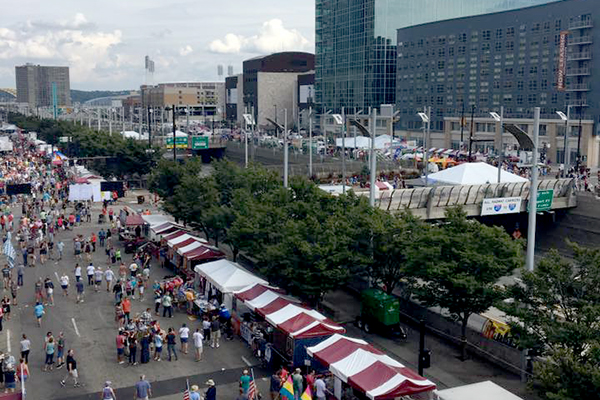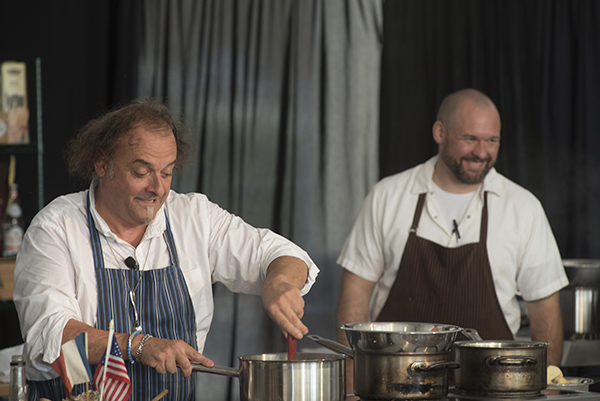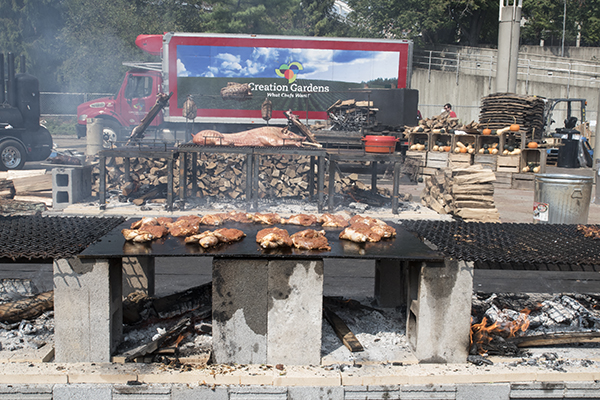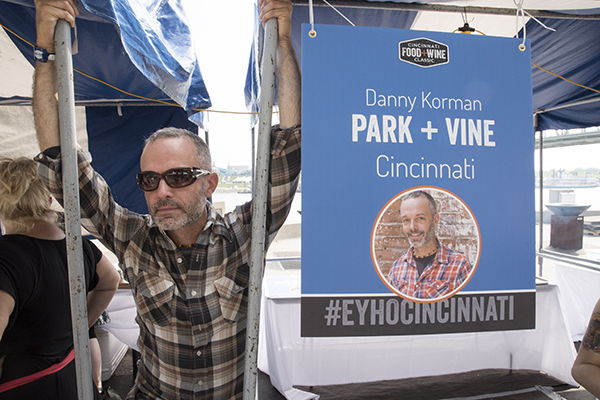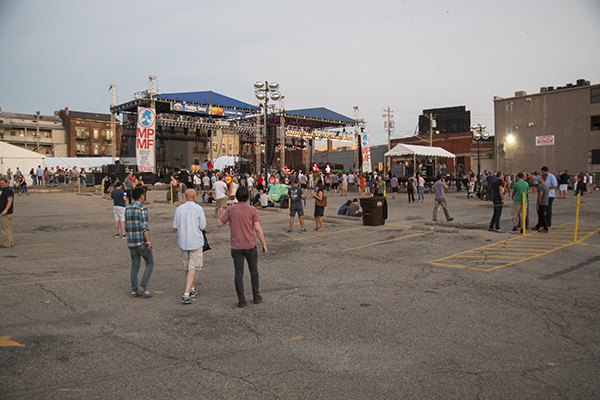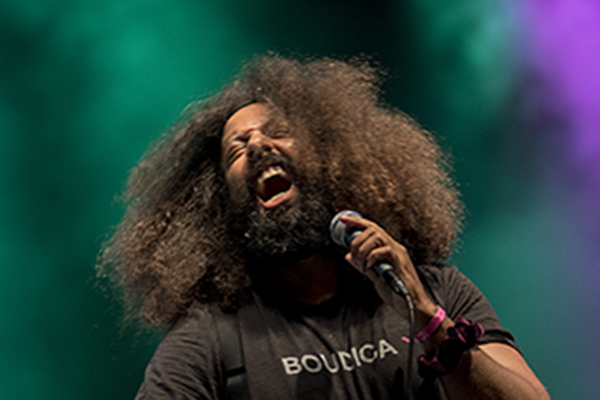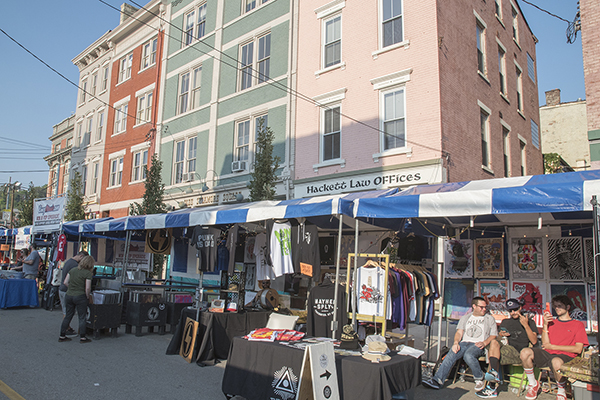Soapdish: Three fall festivals relocate to mixed reviews
A look back on three September festivals — Oktoberfest Zinzinnati, the Cincinnati Food + Wine Classic and MidPoint Music Festival — that changed locations this year with varying degrees of success.
About this time last year, in these very virtual pages, I remarked upon the dizzying whirlwind of local festivals occurring on consecutive weekends in September. Beginning with Oktoberfest Zinzinnati, followed by the Cincinnati Food + Wine Classic and wrapping up with the Midpoint Music Festival, our fair city’s urban core was inundated with a variety of demographics, be it lederhosen-clad sauerkraut ball aficionados on Fifth Street, wine-sipping gourmands in Washington Park or itinerant indie music lovers filling the bars and spaces of Over-the-Rhine.
Coincidentally enough, each one of these festivals moved to a new location this year, with varying degrees of success.
Oktoberfest’s relocation seemed like a no brainer. Six hundred and fifty thousand people crammed into a concrete canyon on Fifth Street seemed like an unnecessary shoehorn of a locale, particularly when you have an entertainment district down on the river as well as a surfeit of shiny new riverside parks.
Faced with the dilemma of our newly launched streetcar bisecting the world’s largest chicken dance, Mayor Cranley offered up a predictable bit of obstinacy and bloviating bluster.
“If it’s a choice between the streetcar and downtown and Oktoberfest, I choose Oktoberfest,” Cranley said. “If it’s between the streetcar and Taste of Cincinnati, I choose Taste of Cincinnati. And this streetcar can run in Over-the-Rhine unaffected. But the idea that we were going to burden Taste of Cincinnati and Oktoberfest in favor of the streetcar is nuts! And it’s completely at odds with the culture and the history of this great city. Half a million people coming downtown enjoying Oktoberfest is more important than the streetcar, period.”
Notwithstanding the mayor’s valiant defense of the “culture and history of this great city,” cooler and more logical heads in the Cincinnati USA Regional Chamber prevailed, recognizing that having our modern streetcar system up and running while 650,000 people descended upon downtown might actually make sense.
Another no brainer, it would seem, right? Well, not so fast Zinzinnati! In the week leading up to Oktoberfest, an unnecessary kerfuffle erupted at City Hall over how many streetcars in the city’s fleet of five would be running. While SORTA’s contract with the city (inexplicably) states that only two streetcars run on the weekend, it also states that wait times should not exceed 15 minutes, which has proven to be completely unattainable with just two cars running.
While an ignominious political sausage-making spectacle took place at City Hall over who pays for what, a white knight in the form of Ad Vehicles, which handles advertising for the streetcar, stepped up and offered to cover the cost to run two additional vehicles, if it became necessary.
The end result: four streetcars running, packed ridership exceeding all projections — with more than 29,000 riders over the weekend — and Ad Vehicles didn’t end up needing to write a check.
Moreover, the relocated Oktoberfest on Second and Third streets between Walnut and Elm streets proved to be an excellent compromise (although I can’t help but wonder why they don’t just move it to The Banks). In addition, the mini-brouhaha over how many cars are running will hopefully highlight necessary tweaks to the streetcar operating hours in order to minimize wait times. Its current schedule, 6:30 a.m. to as late as 1 a.m. on weekends, is completely unnecessary, and should be adjusted to 8:00 a.m. to 11:00 p.m. to generate more frequent service, particularly for a system that has proven to be wildly popular.
Not quite as new as the streetcar, the Cincinnati Food + Wine Classic, in just its third year, found itself already outgrowing its original home in Washington Park. Relocating to Yeatman’s Cove at the Serpentine Wall proved yet another easy decision. Access to actual green grass — instead of the dust bowl that is Washington Park’s lawn in mid-September — was an added bonus.
Expanded programming and two additional large tents proved popular for attendees, and ticket sales were brisk for the event. (Exact numbers were not available as of Monday morning, but organizers reported growth in overall attendance). Several event-goers polled on the spot gave the new and expanded venue high marks.
Unfortunately for my taste buds, instead of enjoying the Food + Wine Classic’s endless supply of gourmet fare all weekend, I had to head over to yet another festival taking place slightly north.
The 15th annual Midpoint Music Festival, under the careful auspices of new ownership by the CSO’s Music & Event Management Inc., re-launched in the form of several surface parking lot venues in Pendleton and a block of Sycamore Street.
You may remember these parking lots from my Soapdish column a few months back, in which I observed “Every day I walk or ride, multiple times, on 12th Street east of Sycamore through the desolate Straits of Pendleton — a dystopian, concentration-camp-like hellscape of undulating asphalt, crumbling pavement, weeds, razor wire and rusted, blown-out cyclone fencing.” Also known as this year’s new home of MPMF, this unrelenting heat sink of parking lots and storm water runoff squats smack-dab in the middle of a thriving historic district, development exploding around it.
Based on the above quote, you might think I would be inclined to dismiss this year’s new format out of hand, and you might be right. My initial reaction to the new parking lot music festival, as opposed to the traditional format, held in bars and venues all over OTR, was decidedly skeptical. Descriptors like “Jammin’ on Sycamore” and “Bunbury North” immediately sprang to mind.
But I was determined to give the new format and its impressive lineup of talent a fair shake. That is, until I stood in the middle of the WNKU stage parking lot in the middle of the afternoon in 87-degree heat while the festival’s opening band HOOPS kicked things off and commented, somewhat sarcastically, “This is a nice parking lot.” I looked around, nodding along at what a sad statement that was.
The bars and individual venues of the past have been exchanged for a better musical lineup and sweltering, mid-afternoon sets in blinding sun. What was struck has essentially been a Faustian bargain for the “bigger and better lineup” of talent, while capturing the all-important alcohol sales necessary to fund it.
But Midpoint was never really a “pure” music festival. It never was really “just about the music.” As observed in last year’s column: “From my perspective, though, what really spotlights the ‘local’ at MidPoint is the neighborhood. Just walking from bar to outdoor venue back to a different bar, you really experience the variety of Over-the-Rhine and downtown. I saw bands at every venue other than the slightly-orphaned Taft Theater, and it was mesmerizing to witness the ebb and flow between different venues and stages and the incessant migration to the next act catalyzing the streets and sidewalks with a spontaneous energy and vibe, nomadic tribes of music lovers parting from the earlier crowds to join up with others.”
That zeitgeist was pretty much obliterated by the new format. This was not about the neighborhood. This could have been anywhere. The spillover buzz into Over-the-Rhine was effectively minimized by what was essentially an indie music internment camp. The two main stages, situated awkwardly next to one another, offered up terrible sightlines to the spectators who were downhill (but decent views for the freeloaders in the garage across the street). Meanwhile, the dueling stages on both sides of 12th Street resulted in a cacophony of blurred sounds bouncing off the sides of the surrounding buildings.
In short, this was a less than impressive debut by MEMI in the inaugural year of their stewardship. The parking lot stages could not hold a candle to the main outdoor stages of year’s past — from Washington Park to the Moerlein brewery to Grammer’s. And while, sure, a lot of this is when-I-was-there-style, misty-eyed, knee-jerk nostalgia for those glory days of yore, it’s sad that what was once an organic and vibrant neighborhood showcase has been commoditized into a music festival that could pretty much exist in Anywhere, USA.
In response to some Twitter criticism, MPMF dug in their heels a bit and noted that they were “committed to the new format.” Meanwhile, multiple requests to MEMI for comment have not yielded a response. Hopefully the organizers will take the feedback they receive to heart, and possibly explore some creative alternatives to the Pendleton Parking Gulag.

